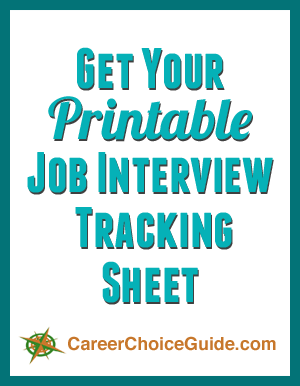Printable Job Interview Strategy Planning Guide
Part of a smart job interview strategy includes tracking all of the details about every interview you attend.
I know this task isn't fun for most job seekers. The last thing anyone wants to do after being interrogated by an employer is sit down and make notes about every detail. You just want to relax with a cup of hot tea (or something stronger). You certainly don't want to rehash in your mind your answers to every crazy or difficult question the employer asked.
Consider this: Making good notes can save you from months of struggling if you're making crucial mistakes in your hunt for work.
I hope I can convince you to take a few minutes after an interview, before you enjoy a well-deserved break, to sit down with the tracking sheet I've provided here and make note of all of the important details about your job interview.
The Interview is Over. Why Bother Tracking the Details?
Simply put, tracking all of the important information about your interviews can help you find a job faster.
Many years ago I made a career change from teaching music to employment counseling. When I started interviewing for my first employment counseling job, every single employer I spoke to asked me why I was leaving my music teaching job. Even if they had a standard list of questions they asked every candidate, they would add that question just for me.
After two or three interviews, it was perfectly obvious that every employer needed to know I was committed to my new career and wanted to make sure there wasn't any red flag reason for leaving my job as a teacher. I knew that in order to land the job I wanted I had to have a explanation for why I was making a career change.
If I hadn't been tracking the questions employers asked me, it might have taken a lot longer to notice and respond to that pattern, and it might have taken a lot longer to find a job in my new field.
Sometimes people get stuck in the interview phase of a job search. They get invited to meet with employers, but they just can't seem to land a job.
If you find yourself in this situation, and you have kept track of important information like:
- the types of questions employers ask
- your answers to those questions
- things your weren't comfortable with in the interview
you can go back and review that information to look for patterns that will help you find mistakes you might be making or concerns employers have with your work history. Then you can adjust your answers to make a better impression the next time.
You'll save yourself a lot of guess work in trying to figure out why you're struggling to find work if you can easily review and assess the job search efforts you've already made.
Because interviews are extremely stressful for most people, they can often feel like a blur of questions and answers. If you don't take time to make some good notes immediately after an interview, you will quickly forget the details, and, therefore, you won't be able to assess and improve your job interview strategy if you find you are having trouble landing a job.
The tracking sheet I've provided also has space for making note of the important basic details you need to track and take care of before you go to the interview, so it will help you ensure you've done good pre-interview preparation as well.
It's all presented on this one simple form to make the job of tracking as painless as possible.
Get the Form!
Click here to download the free tracking sheet (opens a PDF document). Remember to save it to your computer so you can easily go back and print as many copies as you need during your job search.
I earn a commission for purchases made through links on this page. To learn more, please see my disclosure.
Where to Get More Job Search Help
The reason I'm suggesting you take the time to track these details is to help you adjust your job interview strategy if you get stuck in this part of the process of looking for work.
If you have been job searching for a while with no luck, it can be smart to take some time to figure out exactly where you are getting stuck in the process. There's not much point in fine-tuning your cover letters if you're not getting hired because you don't shine in an interview. Likewise, a great resume will only get you so far if the real problem is that you don't know where to find good job leads.
My book, Job Search Mistakes Exposed, is a mini guide that shows you exactly how to figure out where you're getting stuck in the job search process so you can make the right changes that will fix what's broken instead of wasting time tinkering with things you're already doing well.

